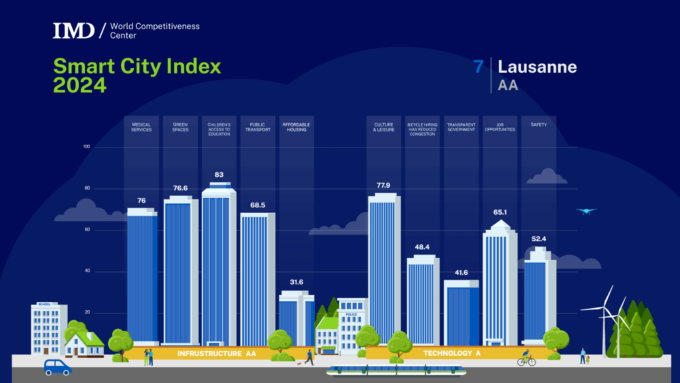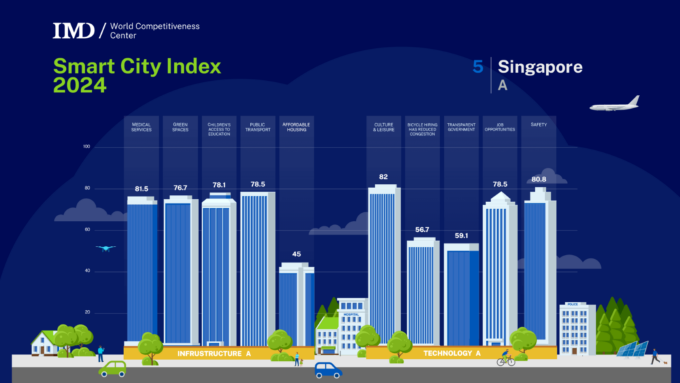
How to get sustainable business transformation right
Sustainable corporate change is a challenging feat to pull off. Julia Binder examines the barriers and drivers of change to increase your chances of success....

by Bruno Lanvin Published May 8, 2024 in Future readiness • 7 min read
Over the last few decades, cities have proved they can be more agile, innovative, and open in many ways than most nation-states — often including their own. Look at how cities like Bilbao, Medellin and Kigali have been able to change their image radically in record-short times, for instance.
By moving closer to center stage, cities have been drawn into a vortex of complex forces that had not traditionally been part of their environment. Some cities had to take health measures into their own hands during COVID-19 in instances when their respective country governments seemed slow or reluctant to do so. Many Brazilian cities fell in this category; they had to learn to become global competitors, to design and adopt innovative (often unprecedented and untested) strategies, and to accept new responsibilities.
Along the way, all these cities have had to learn how to be future-ready. Singapore and Shanghai have long been doing this, but today they are joined by a whole host of smaller cities that are very quickly learning how to become globally competitive.
Until the two main shocks of the early 21st century – namely the financial crisis of 2008-09 and the pandemics of 2002-04 (SARS) and 2020-23 (COVID-19) – the competitiveness of cities was largely defined along the axes used for assessing the competitiveness of nations, specifically their geographical and historical advantages, local economic advantages, and specific policies (e.g., fiscal). Today, the factors that make a city competitive are being revisited in radical ways, with one major area being future-readiness.
Cities are showing signs of trying to be future-ready by earmarking areas such as environmental sustainability, inclusion, diversity, overall quality of life, and effective governance. The rich variety of experiences of smart city leaders in addressing inclusion underpins ‘Prosperous and Inclusive Cities,’ MD’s latest collection of smart city case studies, which is to be published later this month.
Two salient examples are close to IMD’s heart – Lausanne and Singapore – which can be demonstrated with reference to the results of the 2024 IMD Smart City Index, published earlier this year.

Lausanne is a typical example of a ‘second-tier city’. It is not the federal capital of Switzerland (Berne is), nor the economic epicenter (Zurich plays that role). It is not even the country’s most internationally renowned meeting place (perhaps Geneva or Davos would take home that trophy).
This medium-sized city, home to some 140,000 people, boasts a healthy climate, a dynamic cultural and sports environment, and beautiful landscapes. It is also known for its academic strengths, the dynamism and diversity of its business sector, and its multiple successes in innovation. Lausanne is also a city that constantly keeps an eye on its surroundings and adopts imaginative but realistic strategies to prepare for the future. Take, for instance, the new tourism strategy for the city and region of Lausanne, presented last November.

Singapore is unique in many respects. Since becoming independent in 1965, this city-state – covering 720 square km and home to around six million people – has ranked at the top of many global indicators (talent, competitiveness, education, innovation) both as a nation and as a city.
In its latest edition, the IMD Smart City Index shows that the city of Singapore is not only a place where advanced technology has become a part of the life of citizens but also a city for which human-centricity and facilitating residents’ and businesses’ lives are constant concerns. Priorities pursued by local authorities include sustainability and preparedness for possible future challenges, often health- or weather-related.
By redefining their own way to be future-ready, cities will largely redefine our collective future. Whatever their respective size, history, culture, or competitive advantages, all kinds of cities will be contributing to what will be fundamental traits of the next wave of globalization: less centralized, more people-centric, and agile enough to seize the opportunities offered by technological change while maximizing its positive impact on protecting the environment, reducing inequalities, and making our societies more peaceful and knowledge-based.
City leaders and local communities need to have a documented understanding of what technology can bring to help address long-lasting problems in novel ways. Drawing the lessons of past failures and successes will be an important component of that approach. Experimenting with new solutions should also be encouraged.
Technology (including artificial intelligence) will only solve some of the problems at hand. By identifying the main issues to be addressed from the point of view of their citizens, cities will be the places where the most relevant models can be tested and adopted regarding governance, urban design, economic and social choices, competitive strategies, and branding.
Inclusion, diversity, and openness to new ideas and solutions will be a powerful component of cities’ future readiness. By developing international networks of cities able to exchange best practices, all types of cities will acquire additional possibilities to adapt them to their local reality and environment.
Globalization is changing, but its fundamental principles (which include the ability to harness the benefits of competition at a global level) remain a powerful engine to make the world a better place, i.e. more sustainable, less unequal, and one in which values and purpose are a better guide for individual actions than greed and unquenchable thirsts for power.
Over the last few decades, cities have proved more resilient than nation-states vis-à-vis external shocks. This is true in practically all spheres of economic and social activities: health, sustainability, investment, innovation, and talent attraction. They also displayed higher abilities to innovate and adapt to the new conditions of global competition and to focus on human-centric priorities such as inclusion. This trend will be accentuated in the future.
City leaders, investors, and citizens should keep in mind that the future belongs to younger generations, as I wrote about in The Future is Young. Engaging with youth to allow cities to shape the future that we want will require those generations to have an appetite for tomorrow, rather than fearing it. It is the responsibility of those who are at the helm today to show by their vision, their actions, and their behavior that they believe that a better world is feasible. Cities are a good place to start.
This article draws, in part, on Bruno Lanvin’s chapter entitled “The key to cities’ competitiveness: future-readiness,” to be included in the Volume of Studies Sustainable Economic Policy Strategies and Initiatives in Eurasia, which will be launched at the Budapest Eurasia Forum in November 2024.

President of the Smart City Observatory at IMD
Bruno Lanvin has been the President of the Smart City Observatory since its creation in 2018. He is known worldwide for his pioneering work in creating and co-leading some of the most highly praised global indices in the areas of information technology, innovation, and talent.

May 12, 2025 • by Julia Binder in Business transformation
Sustainable corporate change is a challenging feat to pull off. Julia Binder examines the barriers and drivers of change to increase your chances of success....

March 26, 2025 • by Didier Cossin, Yukie Saito in Business transformation
Hannele Jakosuo-Jansson, Executive Vice President of People and Culture at Neste – the world’s largest producer of renewable diesel and sustainable aviation fuel (SAF) – and a board member of Finnair, has...

March 7, 2025 • by Michael D. Watkins in Business transformation
To ride the daunting wave of global economic change, CEOs must first understand their operating environment and then ensure the priorities of their leadership team are aligned, advises IMD’s Michael Watkins...

January 22, 2025 • by Patrick Reinmoeller in Business transformation
In the face of growing competition from BYD and Tesla, Honda and Nissan's large merger wager may not be sufficient to bridge the gap. Thinking outside of the box may be essential...
Explore first person business intelligence from top minds curated for a global executive audience